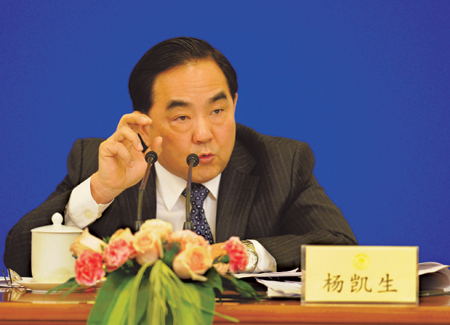Banking
More loans for key industries
By Li Xiang (China Daily)
Updated: 2011-03-07 16:57
 |
Large Medium Small |
|
 |
|
Yang Kaisheng, president of the Industrial and Commercial Bank of China |
"We will increase the amount of loans to these key industries at a faster pace," said Yang Kaisheng, who is also a member of the National Committee of the Chinese People's Political Consultative Conference (CPPCC).
Yang was speaking at a press briefing in Beijing.
By the end of last year, ICBC had extended loans of more than 610 billion yuan ($93.8 billion) to the country's new strategic industries. The growth rate of these new loans in 2010 was 17 percent, which was higher than the bank's average credit growth, said Yang.
He said the supply of credit to the country's strategic industries will continue to be abundant, despite the fact that the central bank will restrict overall lending in a bid to curb excessive liquidity and rising asset bubbles.
Premier Wen Jiabao said during his work report on Saturday that the government will focus on speeding up the development of several strategic industries, including high-end equipment manufacturing, biotechnology, new materials, new-generation information technology, alternative-fuel cars and companies involved in energy-saving efforts as well as developers of environmentally friendly technologies.
The government aims to ensure that the output of these key strategic industries accounts for 8 percent of the country's GDP by 2015.
It was also reported that China will invest up to $1.5 trillion during the next five years in an effort to boost the development of these industries.
| ||||
Yang also expects the bank's personal consumer loan business to grow significantly during the coming five years. Currently, personal consumer loans account for 25 percent of the ICBC's total loans, he said.
In the meantime, the bank will continue to expand its lending to the country's small and medium-sized enterprises and further cut loans to seven industries, including those involved in polysilicon, cement, steel and shipbuilding, which are facing severe overcapacity, Yang said.
When asked about whether the banks are facing increased pressure because of the requirement to hold higher ratios of reserve currency, Yang said that some may indeed come under pressure but banks' tolerance to cope with higher required reserve ratios will be varied and their position will depend on their financial strength and asset structure.
The country's central bank has raised its reserve ratio requirements eight times since last year, driving up the level to 19.5 percent for big banks.
| 分享按鈕 |


